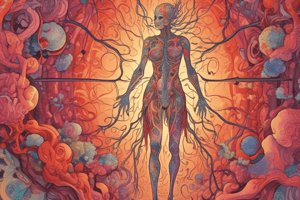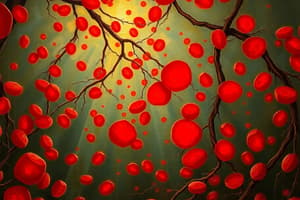Podcast
Questions and Answers
What are the classical signs of acute inflammation?
What are the classical signs of acute inflammation?
Which of the following best describes a cellular exudate?
Which of the following best describes a cellular exudate?
What stimuli can lead to the generation of acute inflammation?
What stimuli can lead to the generation of acute inflammation?
What is the primary process involved in phagocytosis?
What is the primary process involved in phagocytosis?
Signup and view all the answers
Which of the following represents a chemical mediator of inflammation?
Which of the following represents a chemical mediator of inflammation?
Signup and view all the answers
What type of cellular infiltrate is primarily involved in acute inflammation?
What type of cellular infiltrate is primarily involved in acute inflammation?
Signup and view all the answers
Which of the following features is typically associated with chronic inflammation?
Which of the following features is typically associated with chronic inflammation?
Signup and view all the answers
Which is NOT one of the five cardinal signs of inflammation?
Which is NOT one of the five cardinal signs of inflammation?
Signup and view all the answers
What is the typical onset of acute inflammation?
What is the typical onset of acute inflammation?
Signup and view all the answers
Which type of injury is most commonly associated with acute inflammation?
Which type of injury is most commonly associated with acute inflammation?
Signup and view all the answers
What primarily characterizes chronic inflammation compared to acute inflammation?
What primarily characterizes chronic inflammation compared to acute inflammation?
Signup and view all the answers
Which systemic factor is likely to be prominent in acute inflammation?
Which systemic factor is likely to be prominent in acute inflammation?
Signup and view all the answers
Which type of exposure is commonly linked to chronic inflammation?
Which type of exposure is commonly linked to chronic inflammation?
Signup and view all the answers
What is the primary function of cytokines in inflammation?
What is the primary function of cytokines in inflammation?
Signup and view all the answers
Which cytokines are known for their pro-inflammatory effects?
Which cytokines are known for their pro-inflammatory effects?
Signup and view all the answers
What is a significant role of TNF in the inflammatory process?
What is a significant role of TNF in the inflammatory process?
Signup and view all the answers
What effect does histamine primarily have on blood vessels?
What effect does histamine primarily have on blood vessels?
Signup and view all the answers
Which chemical mediator is primarily responsible for vasodilation and systemic inflammatory responses?
Which chemical mediator is primarily responsible for vasodilation and systemic inflammatory responses?
Signup and view all the answers
Leukotrienes are primarily produced by which types of cells?
Leukotrienes are primarily produced by which types of cells?
Signup and view all the answers
What is the major function of chemokines in the immune response?
What is the major function of chemokines in the immune response?
Signup and view all the answers
What distinguishes acute inflammation from chronic inflammation?
What distinguishes acute inflammation from chronic inflammation?
Signup and view all the answers
What is one of the main causes of increased vascular permeability?
What is one of the main causes of increased vascular permeability?
Signup and view all the answers
Which type of phagocytic cell is part of the early inflammatory response?
Which type of phagocytic cell is part of the early inflammatory response?
Signup and view all the answers
What role do chemical mediators play in the inflammatory response?
What role do chemical mediators play in the inflammatory response?
Signup and view all the answers
What is opsonization in the context of the immune response?
What is opsonization in the context of the immune response?
Signup and view all the answers
Which of the following is NOT a type of phagocytic cell mentioned?
Which of the following is NOT a type of phagocytic cell mentioned?
Signup and view all the answers
What type of inflammation is characterized by the presence of pus?
What type of inflammation is characterized by the presence of pus?
Signup and view all the answers
What are cytokines?
What are cytokines?
Signup and view all the answers
Which factor contributes to leakage from new blood vessels during inflammation?
Which factor contributes to leakage from new blood vessels during inflammation?
Signup and view all the answers
Study Notes
Introduction
- Inflammation is a complex biological response to injury or infection
- Inflammation can be acute or chronic
Acute Inflammation
- Characterized by a rapid onset and a short duration
- Often involves neutrophils as the primary inflammatory cells
- There are five cardinal signs: rubor (redness), calor (heat), tumor (swelling), dolor (pain), and loss of function
Causes of Inflammation
- Infections: Bacteria, viruses, fungi, parasites
- Tissue Necrosis: Physical or chemical injuries (heart attack, burns, frostbite)
- Trauma: Blunt or penetrating trauma, burns, frostbite, chemicals
- Foreign bodies: Splinters, sutures, bones, finger nails, popcorn kernels
- Immune (hypersensitivity) reactions: Triggered by environmental factors or autoimmune diseases
Cellular Events in Inflammation
-
Leukocyte recruitment:
- Chemotaxis: Movement of leukocytes towards the site of inflammation following chemical signals
-
Phagocytosis:
- The engulfment of particles by phagocytic cells (neutrophils and macrophages)
- Important for clearing pathogens and cellular debris
Chemical Mediators in Inflammation
-
Chemical messengers:
- Act upon blood vessels, inflammatory cells, or other cells to cause an inflammatory response
-
Two types of chemical mediators:
- Exogenous (external): From outside the body, like endotoxins
- Endogenous (internal): From within the body, produced by cells like leukocytes, endothelial cells, and fibroblasts.
-
Categories of Chemical Mediators:
- Cytokines
- Vasoactive amines (histamine)
- Prostaglandins
- Leukotrienes
- Chemokines
### Cytokines
- Proteins produced by many cells, including macrophages, B lymphocytes, epithelial cells, and neutrophils
- Important for immune cell communication, recruitment, and activation
- Examples include interleukin-1, interleukin-6, interleukin-8, and Tumor Necrosis Factor (TNF)
- TNF can induce fever
Vasoactive Amines
- Histamine: A vasoactive amine released from mast cells
- Acts on blood vessels causing dilation of arterioles and increased permeability
### Prostaglandins
- Lipid compounds produced by mast cells, macrophages, and endothelial cells
- Involved in vascular and systemic reactions of inflammation
- Cause vasodilation, fever, and pain
### Leukotrienes
- Lipid compounds produced by leukocytes and mast cells by the action of lipoxygenase
- Act as chemotactic factors, attracting neutrophils to the site of inflammation
- Often accompanied by histamine and prostaglandins
- Release lysosomal enzymes (e.g. proteases)
- Cause vasoconstriction
### Chemokines
- A family of small proteins
- Primarily act as chemoattractants, attracting specific types of leukocytes to the site of inflammation
- Enhance chemotaxis (cell migration)
### Patterns of Acute Inflammation
- Serous: Characterized by the exudation of a thin, watery fluid
- Fibrinous: Characterized by the exudation of a fibrin-rich fluid
- Suppurative (purulent): An inflammatory response associated with the production of pus, which is a thick, yellowish fluid containing dead neutrophils, bacteria, and other debris
- Ulcerative: Inflammation associated with the formation of an ulcer, an open sore or erosion of the surface of an organ or tissue
Studying That Suits You
Use AI to generate personalized quizzes and flashcards to suit your learning preferences.
Related Documents
Description
This quiz explores the intricacies of inflammation, including its types, causes, and the cellular processes involved. Learn about acute inflammation, the role of leukocytes, and the cardinal signs associated with the response to injury or infection.



